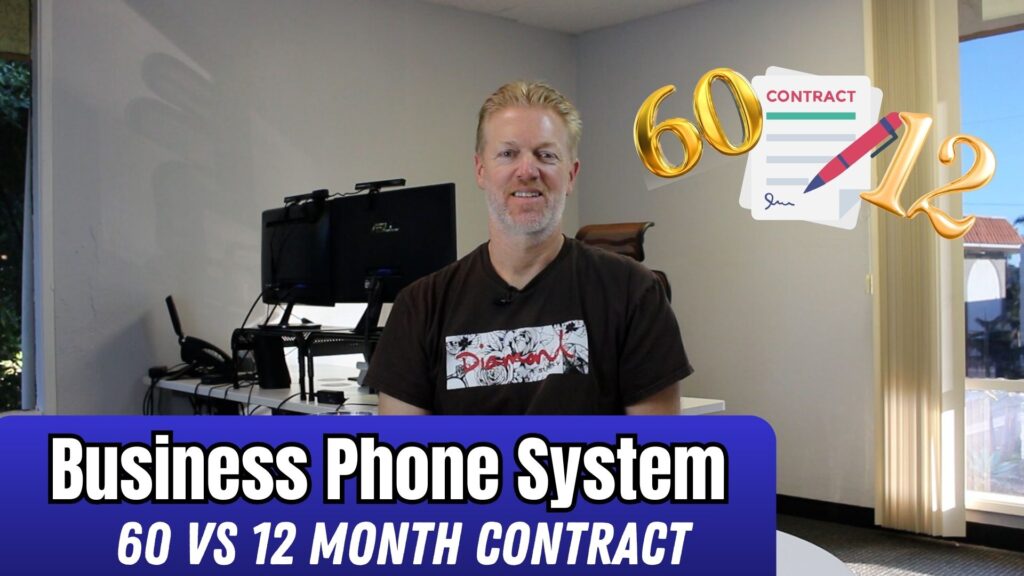Your company is looking for a new business phone system solution, but weren’t sure to sign a 12, 36, or 60-month contract. Most of my customers sign a 36 or 60-month contract and I wanted to share some interesting tradeoffs.
In this video, I cover the details on why customers sign 60-month business phone system contracts.
If you like the video, say thanks by asking Mike for his recommendation on the best call center software for your company! Click below to ask him today.
About Mike

Mike Smith has been helping companies select the best telecom, WAN, security, and cloud services since 1999. He founded AeroCom in 2003, and has been the recipient of numerous business telecommunications industry awards, including being recognized as one of the top 40 business people in tech-heavy Orange County, CA. Follow Mike on YouTube, LinkedIn, Reddit and SpiceWorks.
Transcript
Most of my business phone system customers end up signing 36 month or 60 month contracts with their chosen service provider for cloud business phone system. But recently I’ve had a couple of customers come and request one year contracts with their service provider, and that brought up a bunch of different quotes going back and forth between, hey, one year pricing, you know, 36 month pricing, 24 month pricing, 60 month pricing and a lot of different trade offs popped up on this.
Conversations that I wanted to share with you today. And just overall kind of review why it makes the most sense to sign a 36 month or 60 month contract if you’re signing up for a cloud phone system.
My Recommendations
But before I get too far ahead really quick, if you’d like my recommendation on the best cloud phone system service providers that your company should be quoting. Reach out to me. Send me and email or give me a call (714.593.0011). Send me an email. I’m happy to help. I’m a broker for all the major service providers out there, and I will help you make a lot better decision in a fraction of the time. So make sure you do that.
Check out our custom built search engine
Also, don’t forget to take a look at our website Aerocominc.com. You can actually search cloud business phone systems, service providers and you can search them by feature functionality. You can read reviews from I.T. professionals on there about how they use them for their company. You can watch videos, read details about all this cool stuff. We’ve put a ton of money into the site and it’s a great resource for you.A good place to start, maybe even before you contact me and then after you read some details and want to get a little bit more in-depth. Gordon Contact me, but want to make sure you’re aware of that. And also, as always, don’t forget to subscribe like the video. Ring the bell, all that good stuff to help our videos get out there And as always, leave a comment.
Take legal with a grain of salt
the first word of warning is when you send a contract to legal, I’m sure you guys already know this, but take everything legal says with a grain of salt. They tend to make mountains out of every single molehill on the contract. And before you know it, you’re in a toe to toe, knock em dead, fight with the service provider over something that they’re never going to change. And it kind of sours the whole thing. But a lot of times the legal department tends to make small things into very big things.
And that’s that’s a big one. And this is one of the topics. So a lot of times the legal department will come back and say, hey, you know, we didn’t want to sign anything longer than one year or so forth. But when you really break it down and start looking at what’s involved in that, what are the ingredients in that in that long term contract? And, you know, what’s what’s involved in terms of money,
Re-evaluating your phone system every year
It just starts to not make a whole lot of sense to sign these super short term contracts. You know, first right out of the gate, what i.t. Department wants to reevaluate their business phone system every single year. Now, i don’t know how you guys feel, but most I.T. professionals I talked to don’t like the phone system a whole lot. This is kind of a necessary evil. So the last thing they want to do is have to revisit this thing every single year, record it, go through another discovery process, spend hours doing it when they have a whole list of other projects they got to be working on. So a number one who wants to look at this thing except for every time you absolutely need to, which is usually about every 3 to 5 years.
Another big thing that really stood out on this last go round I had with a couple of customers is the pricing now.
12 month vs 60 month contract
Hey, that’d be great. If you can get this incredible price on a 12 month term, that’s fantastic. But that’s never going to be the case. Most reputable or almost every single reputable cloud business phone system service provider out there It has a big difference between a 12 month contract and a six month contract. Typically, what you’re going to see is around 20 to 25% savings between a 12 month contract and a 60 month contract. Just the math service providers are willing to give you a lot more if you give more commitment to them.
so an easy for instance, there say your company is about to spend $4,000 a month on your cloud business phone system service, you know, a 25% difference going to a 12 month term is going to be $1,000. So that’s a $36,000 savings over the course of 36 months. Right. If you look at the course of a 60 month contract, that’s $60,000 in savings that you’re experiencing going from a 12 month contract to a 60 month contract. So the numbers themselves are pretty huge. So that’s, you know, obviously the biggest thing right there. And you throw on top of that, you start getting to the 36 and six month contracts.
A lot of times are really good service providers throwing in a few free months with that as well. So you look at that and go, hey, that’s another four, eight, $12,000 that you’re saving on top of everything else. And they don’t a lot of times do those three months with a 12 month term.
Are long term contracts risky?
But then you’re thinking, yeah, but man, signing such a long term contract, that’s really risky, right? What if we sign up with a service provider and it’s not what we want? Well, a couple of questions to qualify that came right out of the gate. Now, when you say it’s risky, are you meaning you’re worried about the service quality being bad, the actual dial tone itself, being poor quality, like you’re having outages frequently or it doesn’t work very well consistently.
You know, there’s there’s jumbled voice going on. There’s one way media, there’s a delay in the voice quality. So there’s a few things you can address with that before you sign a contract. So first of all, ask the service provider if they have a service level agreement, SLA, that guarantees a certain amount of service quality. You may also ask for something called a chronic outage clause that guarantees that if you have a certain amount of outages within a certain amount of time, you’re not obligated to fulfill your contract. That’s something that some service providers will offer once in a while. Something you can also do is do a proof of concept, so you can have the service, you know, for free.
Try the software out first
With a lot of service providers, you know, they’ll send you a link to download the software and give you some temporary phone numbers and you can try the service out. You can kind of kick the tires for for a couple of weeks. You can also look online for reviews. You can also look on things like down detector for downtime history with that service provider. There’s a lot of things you can do there to help quash any type of hesitation you have about service quality and customer service. At the end of that too, you’re also protected by the by the public Utilities Commission of your state and the FCC, the Federal Communications Commission. They have to provide you with adequate access to the outside world. That’s your companies. 911 access. So if it’s not working properly, no service provider is going to be able to really hold you to the contract. If you can document that the problems are on their end and not yours.
Try out free proof of concepts for your company
Now, what if you’re worried about functionality like features and functionality like, Hey, what what happens if we get it installed and it doesn’t quite do what we want it to do? Well, I’d say for that one again, free proof of concept will help you with that. So make sure you get a free proof of concept and handed out to a few power users within your organization who can really test it and make sure that it works well. Also, you can do things like use case scenarios on demo so you can have several demos with your chosen service provider, especially if you’re a larger company.
If you have hundreds or thousands of employees, that service provider is going to bend over backwards on the demos for you and really show you as many demos as you want to see. So ask for specific use cases to be demonstrated in the demos. Like you go to the CRM integration and a certain workflow that you have with incoming calls and transferring or call center application, ask for them to demonstrate those. So you see exactly how you’re going to be using the phone system demonstrated in a demo.
Business Downsizing
And lastly, if your concern is downsizing, so you go, you know, 60 month contract, what if a company downsize this? What if we have, you know, a huge downsize like 25% of our of our workforce is laid off or a company just doesn’t need the employees anymore for whatever reason or shrinks or bad economy and all that good stuff. So cash being tied into such a long contract for a long period of time, it’s a little bit scary. Well, there’s a little bit of of leeway there.
Elasticity Clause for 10%
So if if you want some type of flexibility there, say within like 10%, a lot of service providers will offer something called a business downturn clause or an elasticity clause that will allow you to reduce your monthly commitment by up to 10% without penalty.
So gives you some flexibility to say, hey, a couple people get laid off and you add a couple of people later and you’re kind of like, I don’t want to get dinged for early termination penalties when it’s just one or two people here and there. That’s totally understandable. And providers are fine with that, especially if you’re a large organization and they really want to earn your business. And a lot of providers will add that into the contract if you ask.

A big company downsize example
But in terms of like large downsize, so say in that 25% example, let’s break down those numbers a little bit. Okay, So let’s use that. 4000 number again. So say your company has 4000 employees and your company downsizes by 25%. That’s like, hey, worst case scenario, say we get rid of 25% of the employees. That’s a lot right to say you get rid of a thousand employees. Hence why I used that 4000. So it’s a really easy number, right? So you get rid of your company has to lay off 1000 employees. Well, the service provider is not going to let you off the hook for 25% reduction in monthly fees. Initially, you’re like, hey, like, that’s terrible. Look at all the extra monthly fees we’re going to be paying. But let’s think about that. So a thousand employees is 25% or 4000. So if your company lays off a thousand employees, then the amount of monthly cost for that, let’s just use an easy number.
So $15 per month per user for a cloud phone system. All right. So that’s $15,000 in monthly cost that your company is having to pay for that they’re not using. So you think, gosh, $15,000 a month that’s being wasted. That’s huge, right? That’s that’s terrible. I can’t believe the company would still take that money from us. And, you know, it sounds really bad. Like, no way, we want more flexibility than that. But then you start to think about it a little bit more like a thousand employees. What is the payroll for that? So for a thousand employees, on average, if they’re making $40,000 a year, that’s $3,333,333 per month in payroll. So a thousand employees, you do the math yourself. That’s the number.
$15,000 vs $3.3 million
So we’re talking about your company. If you if your company lays off a thousand employees, that’s why they’re laying off employees, because they need to spend three or they need to save $3.3 million in payroll per month. That’s why they’re laying the employees off. They’re not laying the employees off for the $15,000 per month. They’re laying the employees off for the $3.3 million per month that they need to save.
So your company is going to be saving that much money from laying off employees. $15,000 in comparison to that is comparing pennies to dollars. You’re you’re you’re you’re actually saving pennies when dollars are being saved. So you’re worried about the pennies when the dollars are going on. so at the end of the day, when you’re really looking at those numbers, your company in that moment in time is not going to be super stressed out about the $15,000. They’re going to be facing a lot of relief from that $3.3 million in savings that they’re getting. And there’s also going to be a lot of waste that comes with that within the business, like the real estate space. Your company is also going to be in too big of a space for real estate that they can’t get out of the lease for a while.
Labor costs are more expensive than Software costs
I mean, that’s just part of doing business. As a business owner myself, I know how this goes. That’s just part of doing business. You can’t have every agreement that you have in business be completely flexible with dressed check changes and you’ve got to be worried about the big numbers. The big numbers are your labor costs. So that’s the number your companies are going to be worried about. It’s not going to be the software costs. So don’t sacrifice. And remember that math equation we did earlier, where you’re going from a 60 month to a one or a 12 month term and you’re losing all those, you know, all that savings, 40, 50, $60,000 in savings that you could have gotten. Don’t risk all that savings for the slight possibility that your company may have this crazy downturn that it doesn’t expect to have. And even if it does, the savings really isn’t going to be that big of a deal. So don’t look at it that way.
How big was your last phone system?
Also, think about this. When your company had an on prem phone system back ten years ago, companies were buying on prem phone systems and that wasn’t that long ago, you know, and they were doing it for all history before that, when they bought an on prem phone system the last time, I guarantee you they did not buy an on prem phone system that was the exact perfect size for the amount of employees they had at that point in time. They always got a phone system that was too big, that had room to spare for growth. Right? So when your company bought a phone system in the past, it automatically bought a phone system. It was wasting money on from day one that you had too big of a phone system just in case for growth. You had too many phone lines, too big of a phone system, but you needed to because otherwise you’d have to buy a whole new phone system in case you grew.
So that made sense, right? Well, think of it this way. Well, now, when you buy a cloud based phone system, at least chances are you’re not going to be paying for excess phone system unless this crazy catastrophic event happens within your company where you have this huge reduction. And it’s not that big of a deal anyway. So those are some of the things that came up in that last conversation I had with the customer.
My thoughts
So that’s really why why companies at the end of the day, 99.9% of my customers end up signing a 36 or 60 month contract. And that is why when you really start crunching the numbers and look at the logic behind it and look at the cost savings and look at how much time you really want to spend on this thing every single year. It just makes a lot of sense.
Still confused? Reach out and contact me
So I hope that helped. And if you’d like my recommendation on the best phone system vendors to quote for your company, go ahead and reach out to me. Send me an email or give me a call (714.593.0011) I’ve been a broker for all the major companies in this industry for over 20 years, so I know all the best cloud phone system vendors. I know their niche offerings and I and within 5 minutes I can tell you can talk to me about your phone system requirements. And I’ll tell you the small handful of vendors your company should be quoting and why I introduce you to the best sales reps at those companies to work with, oversee the quoting process to make sure you get the best pricing. So make sure you reach out. Send me an email, give me a call, and oh, the best thing on top of all that, my service won’t cost you a dime. The service provider providers pay me my broker fee so your company doesn’t have to even pay me anything. So there’s no excuse not to at least reach out and get my opinion right.
Check out our custom search engine on our website
Also, don’t forget to go to our website. Aerocominc.com, search service providers for your phone systems needs by category by feature. Make sure you go check it out. And as always, like and subscribe to the channel. I’d really appreciate it. Leave a comment. Let me know what you think about the video. Thanks again for watching and I will catch you on the next one.







